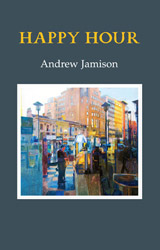 Happy Hour — Andrew Jamison
Happy Hour — Andrew Jamison
Sad and wonderful tension between what is sublime and what is commonplace — an astonishment at this world, augmented by the sardonic awareness that astonishment is nothing new – permeates themes of transience in Andrew Jamison’ first collection, Happy Hour. Critics may find some of these poems hackneyed, but I believe the poet is up to something. ‘The Bus to Belfast’ opens in the voice of a pre-transient speaker. The eponymous bus and its ‘pane’s black rubber seal… nicked to bits / by a penknife’ are as drab a welcome as any; however, in its first line, a sleight of hand evokes a dual theme of loss and scrutiny.
An unstubbed cigarette butt – I can picture it now –
Jamison isolates the image in the midst of its disappearance. He does not witness a total burn-out ‘smouldering at the door of Toal’s’, but imagines what once was visible. Such nostalgia informs ‘The Curzon’ as well, where the speaker remembers the darkness of a cinema visit, how ‘seats are taken, lights dimmed, minds blown.’ The poem opens with the daring conjunction ‘And’ (à la Heaney’s ‘St. Kevin and the Blackbird’) to establish a tense narrative that carries the book. In fact, it would be easy to overlook how the collection is interwoven. ‘The Curzon’ with its haunting ‘And there we are:’ devolves into solitude in the following poem ‘Listening to Ash’ (‘And there I am’). These rhetorical parallels dart in and out of Happy Hour. Likewise, ‘Listening to Ash’ is only the first of a series of poems about listening to bands (Them and Kings of Convenience also get their mentions). For this speaker music is one more impetus for nostalgia, a feature of evanescent relationships. With it’s common themes connecting them, the poems fly together, reinforcing such loneliness ‘as I begrudge the moment its prerogative / to come and go, to up and leave’ (‘Summer’s Time’). Tension mounts in Jamison’s versions of Jorge Guillen, Manuel Bandeira and Pablo Neruda. This draw to Spanish and Portuguese poetry interprets the seemingly-banal features of other poems. For example, ‘Killyleagh Road at Night in Snow’ (after Neruda) targets a lack of fulfillment in terms of time.
This should be the hour of fallen leaves
but is instead the hour of fallen snow.
I ponder old predicaments:
when there are words there seldom is a pen;
when there’s a pen the words are seldom there.
Such ‘old predicaments’, as Jamison hazards, extend his scope from poetic versions to mythology. Aristotle has ‘quite a lot to say for himself ’ in ‘London’; Orpheus is asked to ‘play us out’ (though the speaker ‘can’t be sure about all this’); and ‘Baucis and Philemon’ are retold in a memorial to grandparents. Further afield, Happy Hour dips in and out of America via New York City. If Jamison is tuned to any American voices, his ear inclines somewhere between Frost and O’Hara. ‘What I’ll Say When I Get Back’ claims ‘This is the place, I’ll say, no one and nothing/ but a two-seat bench I’ll sit on by myself ’. The pastoral scene is propped up with ‘sheep shit and rocks/ and puddles and muck which will take’ the walking speaker home. However, he does not arrive home, and the poem turns on an ‘if ’. This meditative ‘if ’ is how we ‘see the path goes on and is the path’ (emphasis added). It is the crafted ambivalence of ‘is’ to which I keep returning. ‘If ’ posits indecision, and ‘is’ suggests, but does not define, some truth about that path and not taking it. Of course, a path is another symbol of transience, and indecision is reinforced (following a stoic enjambment) by the word ‘might’.
But if I’ll hold on
I’ll see the path goes on and is the path
I might yet take, leading as it does
After this pastoral episode, Jamison meditates on ‘the all-encompassing silence of ourselves’ in ‘At the End of the Day’, ‘When all the cups of tea are drunk, dinners done’ and ‘we, loud-mouthed, return/ to our respective rooms’. Separation by rooms makes home ‘where we practice solitude’, likewise, separate from ‘the constant imposition of sky and grass’. In the end, readers of Happy Hour may feel caught between the commonplace and the timeless, haunted by a growing sense that ‘There’s bound to be something in this‘ (‘Autumning’). At the same time they may feel like Jamison’s starlings in ‘The Starlings’, ‘tremendously alike, / tremendously alone’. They will be right, of course. But by my lights, these poems evoke the loneliness of an imagination caught between its rural and urban predilections. These are musings on moving forward, but often do not arrive anywhere. Still, it is easy to imagine the poet winking after all of this. These poems are also about buses.
— Andrew D. Eaton, Edinburgh Review

